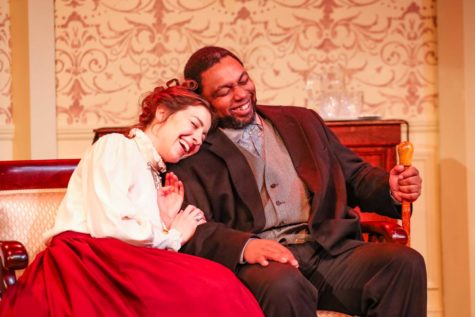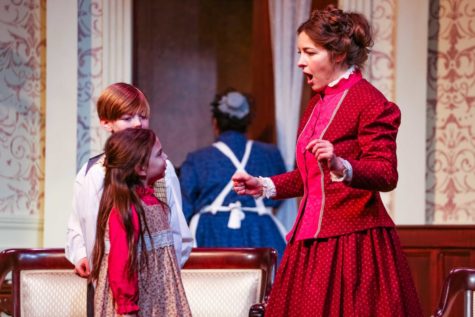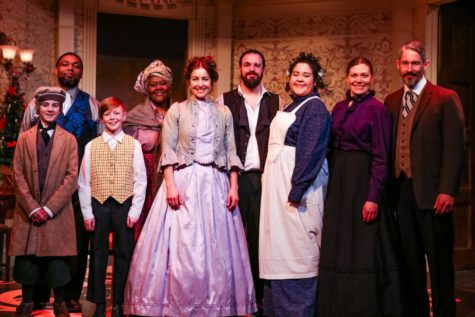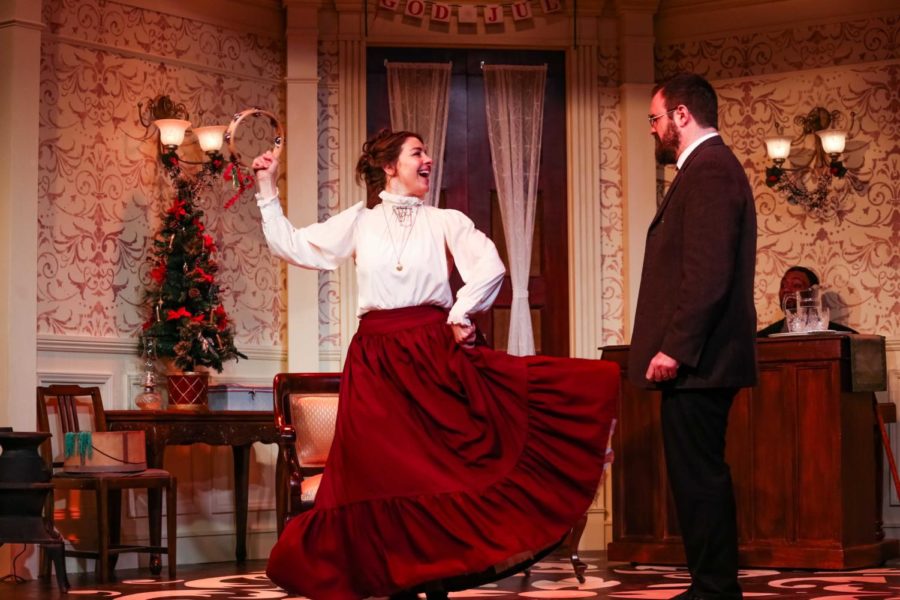Annie Green stars in A Doll’s House
February 19, 2019
Annie Katica Green, the Upper School for Girls Dean of Students, recently starred in A Doll’s House as Nora Helmer, the naïve yet strong female leading role that captured the struggles of being a woman in any household. The play ran January 25-February 10 at the Tacoma Little Theater.
A Doll’s House, by Henrik Ibsen originally published in 1879, is a story of how Nora (Green), the ‘silly girl’ that acts more as a ‘doll’ in her husband’s home, takes on the responsibility of paying back the enormous and secretive debt that she obtained to save her husband’s life. Nora struggles to balance her cover as Helmer’s (Sean Neely) ‘doll’ and the threats from Krogstad (Jason Sharp) who uses her debt as blackmail to keep his job under Helmer.
Green’s performance was brilliant and convincing as she stepped into the role of Nora. She successfully captured and delivered both the naivety and the courage of her counterpart and had the audience at the edge of their seat every time her secret was in danger. The inner conflict of Nora’s identity was obvious, and her desperate attempts to survive and please her husband were both heartbreaking and gripping. As the audience grew closer to the character and watched her mature over the three days the play portrayed, we couldn’t help but applaud the independence she achieved at the end.
During the play talkback, Green commented, “All dramatic characters are human beings and we are capable of experiencing all of those things. When I step into a role, I imagine that I am just accentuating a part of myself that exists but don’t flourish in my day to day. I transfer that to a different era, a different world, different environmental factors and different relationship factors.”

Green has been acting as long as she remembers but the starting point of her career was starring as Annie in Walla Walla’s summer stock production of Annie, the musical, at the age of 10. “I would say it was then, at least in that moment when I was in 4th grade, that theater and acting started playing just as big of a role in my life as school did, which was probably when I knew it was something I cared a lot about,” she said in an interview with Inkwell.
In middle school she auditioned for sitcoms and movies in Los Angeles and in college she obtained a fine arts degree in acting. “I would say that I worked really hard to develop a craft.” Green said. “It’s not something I’m doing just for fun; it’s something I tried to become skilled at, just as someone who writes well and tries to become good at that and as someone who paints tries to become very skilled at their artistry. I have definitely spent a lot of my education working hard to become skilled.”
It was challenging for Green to fit her life as an educator, a mother and an actress into one day, which is why this production was rare and rewarding. “I know there isn’t a lot of time in my life, so I have been really selective about the kinds of plays and characters that I think about making room for. This was a play that I read in college, and I was really captivated by Nora when I read her character. When I saw that this theater was producing it I thought, ‘Now that is one that I would love to just explore.’”

Ibsen, whom director Marilyn Bennett regarded as an early feminist, told a story of a woman’s independence and the discovery of her own identity. In this version of the play, Nora’s story was so much more dangerous and delicate thanks to the depiction of the male characters.
Torvald Helmer, Nora’s husband, was played by Sean Neely. He powerfully portrayed the authoritative husband and caused the audience to fear him as Nora did. However, he also accomplished making the audience feel sympathetic towards him through the love he obviously felt for Nora and sadness he portrayed when his character felt with the obvious lack of control he had when Nora got her independence. The dynamic between the two actors and their characters showed the audience why Nora needed her independence but at the same time showed why she sacrificed so much to save his life.
The story itself was captivating partly due to its relevance: it was almost impossible to believe that it was written about a century and half ago when it could be easily applied to modern life. The difficulties of finding your own voice and your identity in a time when everyone expects you to act in a certain limit is relatable to all women and men in any era.
On this director Bennett commented, “One of the strongest resonances for this (play) is how it travels from 1879 to 2019 in terms of the urgency of the message of people finding agency and finding their voice, having some kind of engagement in their lives that are authentic, real and respected so that they know who they are.”
Sharp agreed with this and said, “I think that these things are so universal, and we have the modern lens to look at it now. Taking a risk and taking every comfort that you have in life because you don’t know who you are – I think that’s a story that everyone can relate to.”











